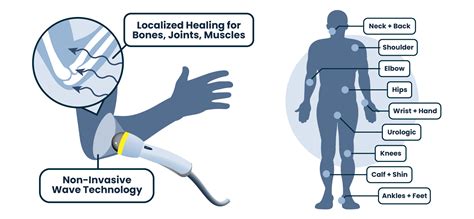How Does Soft Wave Therapy Work
Ronan Farrow
Apr 04, 2025 · 3 min read

Table of Contents
How Does Softwave Therapy Work? A Deep Dive into Acoustic Wave Technology
Softwave therapy, also known as extracorporeal shockwave therapy (ESWT), is a non-invasive treatment that uses acoustic waves to stimulate tissue regeneration and healing. Unlike traditional shockwave therapy, which utilizes high-energy waves, Softwave employs low-energy, focused acoustic waves. This distinction is crucial in understanding its mechanism and benefits. Let's explore how this innovative technology works.
Understanding the Science Behind Softwave Therapy
Softwave therapy leverages the power of radial shockwaves. These waves aren't like the high-energy, jarring waves of traditional shockwave therapy. Instead, they are gentler, focused pulses of energy that penetrate deep into the tissues. This focused energy delivery is what sets Softwave apart and allows for targeted treatment of specific areas.
How the Acoustic Waves Trigger Healing
The precise mechanism isn't fully understood, but research suggests that Softwave's acoustic waves trigger a cascade of beneficial biological effects, including:
-
Increased Blood Flow: The waves stimulate the formation of new blood vessels (angiogenesis), improving blood circulation to the treated area. This enhanced blood supply delivers essential nutrients and oxygen, promoting faster healing and tissue repair.
-
Reduced Inflammation: Softwave therapy can help reduce inflammation, a key factor in many musculoskeletal conditions. By mitigating inflammation, it alleviates pain and promotes a more conducive environment for healing.
-
Stimulation of Cell Regeneration: The acoustic waves stimulate the production of growth factors, signaling molecules that encourage the regeneration of damaged cells. This cellular regeneration is critical for repairing injured tissues and restoring function.
-
Collagen Production: Softwave therapy is shown to stimulate collagen synthesis, a key protein responsible for the strength and elasticity of tissues. This increased collagen production contributes to tissue remodeling and improved structural integrity.
Softwave Therapy Applications: Beyond the Basics
While often associated with musculoskeletal issues, Softwave's applications are surprisingly diverse. Its effectiveness has been demonstrated in treating a variety of conditions, including:
-
Chronic Pain: Softwave can provide effective pain relief for conditions like plantar fasciitis, tennis elbow, and rotator cuff tendinitis.
-
Erectile Dysfunction: Some studies suggest Softwave therapy can improve erectile function by enhancing blood flow to the penis.
-
Cellulite Reduction: By stimulating collagen production and improving skin texture, Softwave can contribute to a reduction in the appearance of cellulite.
-
Wound Healing: Softwave may accelerate wound healing by promoting angiogenesis and cell regeneration.
Advantages of Softwave Therapy: Why Choose Acoustic Waves?
Softwave therapy offers several advantages over other treatment options:
-
Non-Invasive: It's a non-surgical procedure, avoiding the risks and recovery time associated with surgery.
-
Minimal Side Effects: Side effects are generally mild and temporary, often including slight bruising or soreness.
-
Fast Treatment Sessions: Sessions are typically short and painless.
-
Targeted Treatment: The focused nature of the acoustic waves allows for precise treatment of specific areas.
Conclusion: A Promising Therapeutic Modality
Softwave therapy represents a significant advancement in non-invasive treatment options. By harnessing the power of low-energy acoustic waves, it offers a safe and effective way to stimulate tissue regeneration, reduce inflammation, and alleviate pain. While further research is always ongoing, the current evidence strongly suggests Softwave therapy's efficacy and potential as a valuable tool in healthcare. If you are considering Softwave therapy, consult with a qualified healthcare professional to determine if it's the right choice for you.
Featured Posts
Also read the following articles
| Article Title | Date |
|---|---|
| How Do Weather Conditions Affect Fishing Success | Apr 04, 2025 |
| How Do You Get To San Sebastian | Apr 04, 2025 |
| How Far From Road To Hunt | Apr 04, 2025 |
| How Does A Generator Work Without Electricity | Apr 04, 2025 |
| How Is Testosterone Made From Yams | Apr 04, 2025 |
Latest Posts
-
How Long Do Wood Chips Last
Apr 05, 2025
-
How Long Do Vacuum Sealed Strawberries Last In The Fridge
Apr 05, 2025
-
How Long Do Troches Take To Work
Apr 05, 2025
-
How Long Do Theresa Caputo Live Shows Last
Apr 05, 2025
-
How Long Do Tball Games Last
Apr 05, 2025
Thank you for visiting our website which covers about How Does Soft Wave Therapy Work . We hope the information provided has been useful to you. Feel free to contact us if you have any questions or need further assistance. See you next time and don't miss to bookmark.
